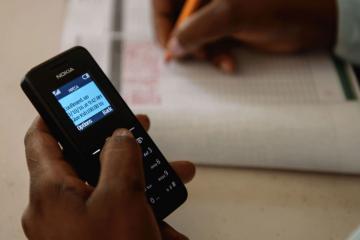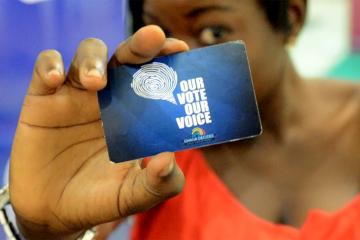Digital IDs and e-payments in Africa: Consolidating what we (don’t) know (yet)

Digital IDs: A focus on growing the body of evidence
Digital identification (ID) can improve targeting and reduce leakages of government programs, while also enabling citizens to participate in the digital economy. However, digital ID systems can also lead to exclusion of vulnerable groups—such as marginalized women and people living in rural areas who may be less likely to have the ID—to ID-linked government services and could lead to the erosion of privacy if strong data protection protocols aren’t in place. The implementation of digital ID systems may be particularly challenging in specific contexts, such as remote areas with limited internet connectivity and electricity.
Conducting research on the impact of IDs can be helpful to understand the potential of these ID systems, and generate alignment among implementing partners on how best to design and implement these programs. Although some research has been conducted on digital IDs in South Asia, more evidence is needed to understand the impacts of these reforms in sub-Saharan Africa.
Read more about how expanding the evidence base on digital IDs in Africa can impact policy and practice in three consolidated resources from the Digital Identification and Finance Initiative (DigiFI Africa) team:
Digital payments: Access to mobile money and digital transfers can support households during tough times
The growing body of research on mobile money shows a consistent finding: households are able to better respond to unforeseen difficulties when they have access to mobile money. When an unexpected negative event—such as a flood or a child falling ill—occurs, households with mobile money are able to rely on the easy and affordable transfer of money from family and friends, even if they are living far away.
Digital transfers, distributed through mobile money, can be particularly useful in supporting households through tough times. New evidence from two Kenyan counties shows that digital transfers reduce hunger, illness, and risk exposure during crises, such as the Covid-19 pandemic.
Read more about the summary of the impacts of mobile money and digital payments:
- [Project syndicate blog] How a universal basic income helped Kenyans fight Covid
- [African Arguments blog] Preparing for shocks through universal basic income: Evidence from Kenya
- [J-PAL blog] The role of a (digital) universal basic income in supporting pandemic resilience
- [J-PAL blog] Digital payments in sub-Saharan Africa: Trends over the past decade
- [J-PAL blog] The rise of mobile money in sub-Saharan Africa: Has this digital technology lived up to its promises? [African Arguments blog repost]
- [J-PAL blog] Should government payments be digitized?
Gender and digitization
While there is no silver bullet for achieving gender parity, transferring funds through direct deposits to women’s accounts or mobile payments can give women more control over the use of financial resources and improve their economic empowerment. In general, digital technology presents an opportunity to narrow gender gaps by enhancing women’s access to welfare services, ID, and financial services and information. However, given the gender gap in digital literacy and the takeup of digital products, the rollout of digital technology could amplify the divide in access to financial services between men and women. More research is needed to unpack these gender effects and understand the mechanism behind the way that technology may facilitate more equitable outcomes based on gender.
The DigiFI team explores these gender effects in the following blog:
Big-data and digitization
As governments and organizations digitize more systems, new data can be more regularly collected and updated and more easily transmitted. Leveraging these data could have a big effect on the ability to manage and use the information generated.
We explore the way that data can be leveraged in the following post and display an example of a dashboard based on digital ID and e-payments data.
Unpacking the mechanisms behind digitisation of IDs and payments
In late 2020, the Digital Identification and Finance Initiative staff launched a blog series: Deepening our understanding of the digital ID and e-payment research agenda. The series unpacks ways in which digital ID and e-payment reforms may have an impact in sub-Saharan Africa and digs into the possible channels underlying these effects.
| Identifying intended participants | Managing the delivery of the program | Ensuring high take-up of the program |
|
[African Arguments blog] The challenges of targeting social protection programs [J-PAL blog] Reaching the most vulnerable: Can digitization improve social assistance targeting? |
[J-PAL blog] The leaky bucket: Can digitization of social welfare programs reduce leakages? [African Arguments blog repost] [J-PAL blog] Incentivizing public sector employees: The role of digital technology in enhancing the carrot and the stick |
[J-PAL blog] Overcoming under-subscription of welfare programs: Digital solutions to low take-up [African Arguments blog repost] |
Funding and celebrating African Scholars
Forty percent of DigiFI projects are led by J-PAL African Scholars. These funded African Scholar projects include four pilot projects and nine proposal development grants, and we look forward to funding more African Scholar projects in the future. Read more about our African Scholars program and the spotlights series on specific African Scholars who are part of our network.
Digital Identification and Finance initiative (DigiFI Africa)
DigiFI Africa, based at J-PAL Africa, was launched in early 2019. We fund rigorous research to understand the impact of digital identification and e-payment reforms on citizens, the private sector, and governments across sub-Saharan Africa. DigiFI Africa is also honored and excited to be one of the pillars of the G7 Partnership for Women’s Digital Financial Inclusion in Africa. A number of high-level events were hosted in support of this partnership.
- [J-PAL blog] J-PAL Africa launches the Digital Identification and Finance Research Initiative (DigiFI Africa)
- [Framing paper] Digital Identification & Finance Initiative Africa: An Overview of Research Opportunities
- [J-PAL blog] DigiFI Africa: A pillar of the G7 Partnership for Women’s Digital Financial Inclusion in Africa
- [J-PAL blog] Building back better: Catalyzing digital financial services for women across Africa





